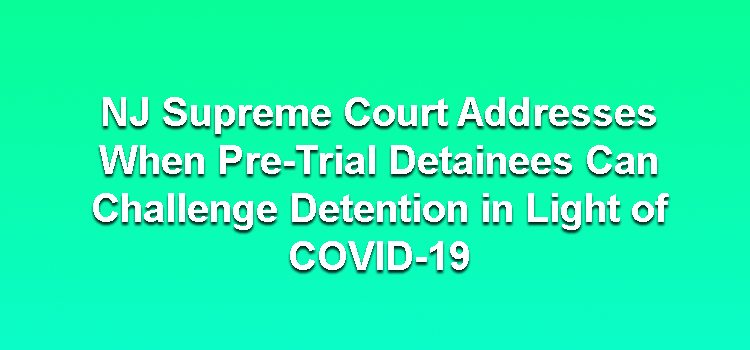
The Supreme Court of New Jersey recently addressedthe impact of the COVID-19 pandemic and the suspension of in-person criminal jury trials on defendants who have been detained pretrial. In the Matter of the Request to Release Certain Pretrial Detainees (M-550-20/085186) (Decided February 11, 2021), the court declined to grant categorical relief to broad categories of criminal defendants. However, it did hold that defendants who have been detained for at least six months may seek to reopen their detention hearings under N.J.S.A. 2A:162-19(f).
Facts of In the Matter of the Request to Release Certain Pretrial Detainees
Under the Criminal Justice Reform Act (CJRA or Act), defendants who pose a serious risk of non-appearance, danger, or obstruction can be detained before trial if no combination of conditions of release will reasonably guard against those risks. Due to COVID-19, very few criminal jury trials have been held since March 2020, and the length of pretrial detention has been extended in many cases.
In response to the situation, the Office of the Public Defender and the American Civil Liberties Union of New Jersey (ACLU) filed suit, seeking two forms of relief: (1) the release of all defendants detained for six months or longer whose most serious charge is a second-degree offense or lower, with an opportunity for the State to object in individual cases and seek to justify continued detention under an enhanced burden of proof; and (2) new detention hearings under N.J.S.A. 2A:162-19(f) for all defendants detained for six months or longer who are charged with a first-degree offense and entitled to a presumption of release.
NJ Supreme Court’s Decision in In the Matter of the Request to Release Certain Pretrial Detainees
The New Jersey Supreme Court held thatSection 19(f) of the CJRA, under which individual defendants can apply to reopen detention hearings if they can present information that was not known at the time of the initial hearing and that “has a material bearing” on the release decision, offers a path for potential relief under the present circumstances. “We hold that the unexpected duration of the pandemic coupled with the continued suspension of jury trials, with no clear end date for either, constitutes new information within the meaning of the statute,” Chief Justice Stuart Rabner wrote on behalf of the unanimous court.
The New Jersey Supreme Court further held that “materiality presents a separate issue” and depends on a defendant’s individual circumstances. To assess whether delays caused by the pandemic are material to the level of risk a defendant poses, trial judges can consider the following factors: (1) the length of detention to date as well as the projected length of ongoing detention; (2) whether a defendant has been or will be in detention longer than the likely amount of time the person would actually spend in jail if convicted; (3) the existence and nature of a plea offer; (4) a defendant’s particularized health risks, if any, and whether they present a heightened risk the individual will contract COVID-19; and (5) other factors relevant to pretrial detention that are outlined in N.J.S.A. 2A:162-20.
“Defendants who have been detained for at least six months, and can make a preliminary showing that they are entitled to relief based on one or more of the above factors, have the right to reopen their detention hearings under section 19(f),” Chief Justice Rabner explained.
In reaching its decision, the court declined to grant relief on a categorical basis. “The fact-specific inquiry called for is best conducted on an individual basis in order to balance the relevant factors and assess the level of risk each defendant presents,” Chief Justice Rabner wrote. “By contrast, broad-based relief for large categories of defendants could sweep in cases in which release from detention would not be appropriate.”
Under the court’s ruling, trial judges have discretion to resolve motions that do not meet both conditions without holding a hearing. The New Jersey Supreme Court further directed that hearings should be conducted on an expedited basis in the trial court, and reviewed in the same manner on appeal. It further advised that defendants subject to a presumption of detention — those charged with murder or facing a sentence of life imprisonment — will likely not be eligible for new hearings.
